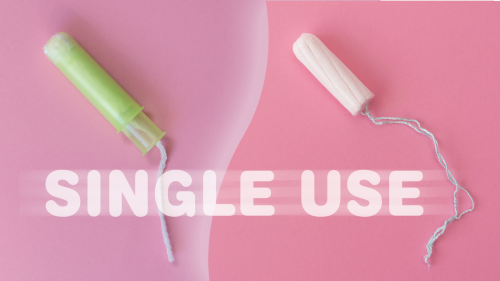U.S. Food & Drug Administration
The Facts on Tampons—and How to Use Them Safely
Tampons cleared by the FDA are meant to be used one time and then thrown away. No tampon should be used more than once.

Tampons—shown within an applicator on the left and without an applicator on the right—are regulated by the U.S. Food and Drug Administration as medical devices.
December 23, 2024: The FDA is aware of concerns about tampon safety after a 2024 study found metals in tampons during laboratory testing. An update from the FDA can be found here.
If you use tampons during your period (or menstruation), it’s important to know how to use them safely. Consider this important information from the U.S. Food and Drug Administration — and please share this information with other people who may use these products.
What are tampons — and how are they used?
Tampons are one method of absorbing menstrual flow during your period. Tampons are designed to be inserted into the vagina with or without an applicator.
You may be surprised to learn that the FDA regulates tampons as medical devices. Tampons cleared by the FDA are meant to be used one time and then thrown away. No tampon should be used more than once.
What are tampons made out of?
FDA-cleared tampons are made of cotton, rayon, or a blend of the two. The absorbent fibers used in FDA-cleared tampons sold today are made with a bleaching process that is free from elemental chlorine, which also prevents products from having dangerous levels of dioxin (a type of pollutant found in the environment).
How does FDA evaluate the safety of tampons?
Before any tampons can be legally sold in the U.S., they must go through the FDA’s review to determine whether they are as safe and effective as (substantially equivalent to) legally marketed tampons.
As part of the FDA’s review, manufacturers submit data including the results of testing to evaluate the safety of the materials used to make tampons and applicators (if present); tampon absorbency, strength, and integrity; and whether tampons enhance the growth of certain harmful bacteria or change normal bacteria levels in the vagina.
Are reusable tampons safe?
Reusable tampons may carry additional risks of infections such as yeast, fungal, and bacterial infections.
While you may have heard about reusable tampons, the FDA has not cleared or approved these products. The FDA discourages the use of reusable tampons.
The only tampons cleared or approved by the FDA are designed for single use.
What should you know about tampons and toxic shock syndrome (TSS)?
Toxic shock syndrome (TSS) is rare and is caused by a toxic substance that is produced by certain kinds of bacteria. The toxic substance produced by the bacteria can cause organ damage (including kidney, heart, and liver failure), shock, and even death.
Rates of reported TSS cases associated with tampons have declined significantly over the years. One reason is that the FDA evaluates whether a tampon enhances the growth of the bacteria that causes TSS before the product can be legally marketed. Only tampons that have been cleared by the FDA can be legally marketed in the U.S. In addition, more informative tampon labeling, as well as educational efforts by the FDA and manufacturers, may have contributed to the reduction in TSS cases. For more information on TSS, see the tampon safety tips, below.
Tampon Safety Tips
You may want to talk with your health care provider about whether tampons are right for you. If you use tampons, consider the following:
- Follow all labeled directions. Even if you have used tampons before, read the instructions in the package.
- Wash your hands before and after using a tampon. This will help reduce the spread of bacteria.
- Only use tampons when you have your period. Tampons are not intended to be used at any other time or for any other reason.
- Change each tampon every 4 to 8 hours. Never wear a single tampon for more than 8 hours at a time.
- Use the lowest absorbency tampon needed. If you can wear one tampon up to eight hours without changing it, the absorbency may be too high.
- Contact your health care provider if you have pain, fever or other unusual symptoms. If you have discomfort, pain or other unexpected symptoms like unusual discharge when trying to insert or wear a tampon, or if you have an allergic reaction, stop using tampons and contact your provider.
- Know the signs of toxic shock syndrome (TSS) and how to reduce your risk. Symptoms and signs of TSS may include a sudden fever (usually 102°F or more), vomiting, diarrhea, fainting or feeling like you are going to faint when standing up, dizziness, or a rash that looks like a sunburn. If you have any of these symptoms during your period or soon after your period, stop using tampons and seek medical attention immediately. To reduce your risk of TSS, use the lowest absorbency tampon necessary, wear a tampon for no more than 8 hours and then throw it away, and use tampons only when you have your period.
If you have had discomfort or became ill as a result of using a tampon, consider reporting it to MedWatch, the FDA’s safety information and adverse event reporting program. Information reported to MedWatch helps the FDA to ensure tampons remain safe.